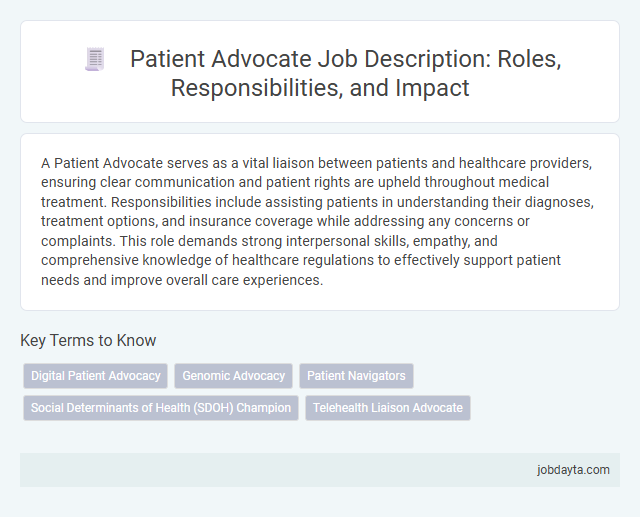A Patient Advocate serves as a vital liaison between patients and healthcare providers, ensuring clear communication and patient rights are upheld throughout medical treatment. Responsibilities include assisting patients in understanding their diagnoses, treatment options, and insurance coverage while addressing any concerns or complaints. This role demands strong interpersonal skills, empathy, and comprehensive knowledge of healthcare regulations to effectively support patient needs and improve overall care experiences.
Introduction to the Patient Advocate Role in Healthcare
```htmlA Patient Advocate plays a critical role in healthcare by supporting patients throughout their medical journey. This professional helps navigate complex healthcare systems and ensures patients' rights and needs are prioritized.
Patient Advocates communicate with healthcare providers to clarify treatment options and coordinate care. Your well-being benefits from their guidance, ensuring informed decisions and improved healthcare experiences.
```Key Responsibilities of a Patient Advocate
Patient advocates play a critical role in supporting individuals navigating complex healthcare systems. Their primary responsibility is to ensure patients receive fair, respectful, and informed care.
- Communication Facilitation - Patient advocates act as liaisons between patients, families, and medical professionals to improve understanding and collaboration.
- Rights Protection - They ensure that patients' legal and ethical rights are upheld during medical treatment and decision-making processes.
- Resource Coordination - Advocates help patients access necessary healthcare services, insurance benefits, and community resources efficiently.
Essential Skills and Qualifications for Patient Advocates
Patient advocates play a critical role in guiding individuals through the complexities of healthcare systems. Their essential skills and qualifications ensure patients receive appropriate care and support.
- Effective Communication - Ability to clearly convey information between patients and healthcare providers to ensure understanding.
- Empathy and Compassion - Demonstrates genuine care and concern for patients' emotional and physical needs.
- Knowledge of Healthcare Regulations - Understanding of legal rights, medical terminology, and healthcare policies to protect patient interests.
Your role as a patient advocate demands continuous learning and strong interpersonal abilities to make a meaningful impact.
How Patient Advocates Improve Patient Outcomes
Patient advocates play a crucial role in improving patient outcomes by ensuring clear communication between patients and healthcare providers. They help patients understand their treatment options, thereby empowering them to make informed decisions about their care. By addressing patient concerns and coordinating care, advocates reduce hospital readmissions and enhance overall patient satisfaction.
The Role of Patient Advocates in Navigating Healthcare Systems
Patient advocates play a critical role in guiding patients through complex healthcare systems. They bridge the communication gap between patients and providers to ensure optimal care delivery.
- Facilitating Communication - Patient advocates help interpret medical information and convey patient concerns effectively to healthcare professionals.
- Coordinating Care Services - They organize appointments, treatments, and follow-ups to create a cohesive care plan tailored to patient needs.
- Supporting Patient Rights - Advocates educate patients on their rights and assist in navigating insurance, billing, and consent issues.
Communication and Advocacy Strategies for Patient Advocates
Patient advocates play a crucial role in bridging the gap between patients and healthcare providers. Effective communication ensures patients' needs and concerns are clearly understood and addressed.
Successful advocacy strategies include active listening, empathy, and clear information exchange. Patient advocates facilitate informed decision-making by translating medical jargon into understandable terms. Empowering patients through education and support enhances their engagement in healthcare processes.
Challenges Faced by Patient Advocates and How to Overcome Them
Patient advocates navigate complex healthcare systems to ensure patients receive proper care and support. They often encounter barriers such as unclear medical information and limited access to resources.
Effective communication skills and in-depth knowledge of healthcare policies can help overcome these challenges. Building strong relationships with medical professionals enhances advocacy efforts and patient outcomes.
The Impact of Patient Advocacy on Patient Satisfaction and Safety
How does patient advocacy influence patient satisfaction and safety in healthcare settings?
Patient advocacy plays a crucial role in enhancing patient satisfaction by ensuring that patients' concerns and preferences are heard and addressed effectively. This engagement promotes safer healthcare outcomes by reducing medical errors and improving communication between patients and providers.
Collaboration Between Patient Advocates and Healthcare Providers
Patient advocates serve as vital liaisons between patients and healthcare providers, ensuring clear communication and personalized care. Collaborative efforts enhance patient outcomes by addressing concerns promptly and coordinating treatment plans effectively. Integrating patient advocates within healthcare teams fosters trust, improves satisfaction, and promotes shared decision-making.
Future Trends in Patient Advocacy and Career Opportunities
| Aspect | Details |
|---|---|
| Future Trends in Patient Advocacy |
|
| Career Opportunities in Patient Advocacy |
|
Related Important Terms
Digital Patient Advocacy
Digital patient advocacy leverages technology to enhance patient communication, ensuring timely access to medical information and personalized support throughout the healthcare journey. Advanced platforms utilize data analytics and telehealth tools to empower patients in managing their care plans, improving outcomes and satisfaction.
Genomic Advocacy
Patient advocates specializing in genomic advocacy play a critical role in guiding patients through complex genetic testing and personalized medicine options. They ensure patients understand their genomic data, facilitate informed decision-making, and connect them with tailored treatment plans to improve healthcare outcomes.
Patient Navigators
Patient Navigators serve as vital Patient Advocates by guiding individuals through complex healthcare systems, ensuring timely access to medical services, and facilitating communication between patients and providers. Their role enhances patient outcomes by addressing barriers related to insurance, transportation, and health literacy.
Social Determinants of Health (SDOH) Champion
A Patient Advocate dedicated to Social Determinants of Health (SDOH) champions equitable access to healthcare by addressing factors such as housing stability, food security, and transportation barriers that impact patient outcomes. Leveraging community resources and policy knowledge, they drive initiatives that reduce health disparities and enhance care coordination for vulnerable populations.
Telehealth Liaison Advocate
A Telehealth Liaison Advocate specializes in bridging the gap between patients and digital healthcare services, ensuring seamless access and personalized support throughout virtual consultations. This role enhances patient satisfaction by addressing technological barriers, clarifying medical information, and coordinating care across remote platforms.
Patient Advocate Infographic

 jobdayta.com
jobdayta.com